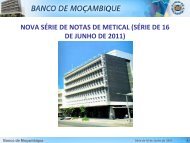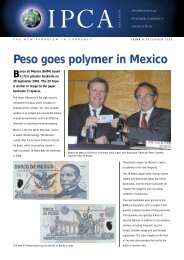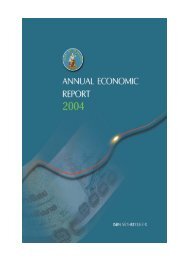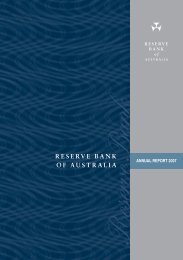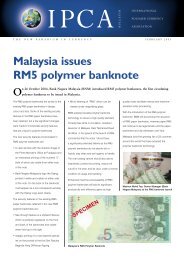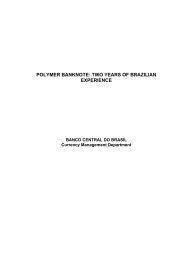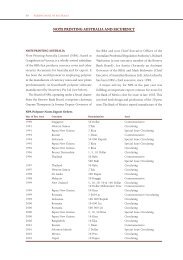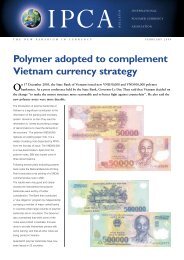ANNUAL REPORT 2008 - Polymer Bank Notes of the World
ANNUAL REPORT 2008 - Polymer Bank Notes of the World
ANNUAL REPORT 2008 - Polymer Bank Notes of the World
Create successful ePaper yourself
Turn your PDF publications into a flip-book with our unique Google optimized e-Paper software.
institutions. The Federal Reserve Systemaccepts primary oversight responsibility forCLS under a cooperative oversight arrangementinvolving <strong>the</strong> G10 central banks and <strong>the</strong> centralbanks <strong>of</strong> CLS-settled currencies. Within thiscooperative oversight arrangement, <strong>the</strong> ECB(in close cooperation with <strong>the</strong> euro area NCBs)has primary oversight responsibility for <strong>the</strong>settlement <strong>of</strong> <strong>the</strong> euro by CLS.In terms <strong>of</strong> value, CLS is <strong>the</strong> largest paymentsystem settling euro transactions outside <strong>the</strong> euroarea. Accordingly, <strong>the</strong> safety and efficiency <strong>of</strong>CLS and its compliance with <strong>the</strong> Eurosystempolicy principles 20 is <strong>of</strong> primary importance to<strong>the</strong> Eurosystem. In December <strong>2008</strong> CLS settledan average <strong>of</strong> 473,000 foreign exchangetransactions per day with an average dailysettlement value equivalent to €3.3 trillion. 21 Thisis a substantial increase in terms <strong>of</strong> volumecompared with December 2007, when CLSsettled an average daily volume <strong>of</strong> 381,436transactions with an average daily settlementvalue equivalent to €2.9 trillion. With a share <strong>of</strong>around 21% <strong>of</strong> all transactions settled in CLS, <strong>the</strong>euro has continued to be <strong>the</strong> second mostimportant currency for settlement, after <strong>the</strong> USdollar (around 44%). In <strong>2008</strong> <strong>the</strong> average dailyvalue <strong>of</strong> CLS transactions settled in euro was€560 billion.In <strong>2008</strong> <strong>the</strong> BIS published a report entitled“Progress in reducing foreign exchangesettlement risk”. 22 The report, which includescontributions from <strong>the</strong> Eurosystem, indicatesthat <strong>the</strong> comprehensive long-term strategyendorsed by <strong>the</strong> G10 central banks in 1996has significantly reduced <strong>the</strong> systemic riskarising from <strong>the</strong> way in which foreign exchangetransactions are settled. However, it alsopoints out that more can and should be doneby individual institutions, industry groups andcentral banks to tackle remaining exposureand to guard against <strong>the</strong> risk <strong>of</strong> reversing <strong>the</strong>progress that has already been made.SWIFTThe ECB participates with <strong>the</strong> o<strong>the</strong>r G10 centralbanks in <strong>the</strong> cooperative oversight <strong>of</strong> SWIFT,with <strong>the</strong> Nationale <strong>Bank</strong> van België/BanqueNationale de Belgique being <strong>the</strong> overseer withprimary responsibility. The G10 cooperativeoversight <strong>of</strong> SWIFT concentrates on <strong>the</strong>objectives <strong>of</strong> security, operational reliability,business continuity and resilience <strong>of</strong> <strong>the</strong> SWIFTinfrastructure. During <strong>2008</strong> <strong>the</strong> oversightgroup reviewed whe<strong>the</strong>r SWIFT was pursuing<strong>the</strong>se objectives by ensuring <strong>the</strong> existence <strong>of</strong>governance arrangements, structures, processes,risk management procedures and controls thatenable it to effectively manage <strong>the</strong> potentialrisks to <strong>the</strong> proper functioning <strong>of</strong> marketinfrastructures using SWIFT and to financialstability in general.In <strong>2008</strong> <strong>the</strong> SWIFT overseers paid particularattention to SWIFT’s project to move to amulti-zone messaging architecture. SWIFT’sprocessing will be divided into two zones,namely <strong>the</strong> transatlantic and <strong>the</strong> Europeanzone, with <strong>the</strong> aim <strong>of</strong> increasing <strong>the</strong> processingcapacity <strong>of</strong> its infrastructure, enhancing itsresilience and meeting European data protectionrequirements. As part <strong>of</strong> <strong>the</strong> project, whichwill be implemented in two phases by 2010and 2013 respectively, a new global operatingcentre will be established in Europe to serveboth <strong>the</strong> transatlantic and European zones.European-based customers <strong>of</strong> SWIFT will beautomatically assigned to <strong>the</strong> European zone,with all <strong>the</strong>ir intra-European traffic beingprocessed and stored in Europe. The overseersare reviewing SWIFT’s processes for <strong>the</strong> designand roll-out <strong>of</strong> this architecture, while at <strong>the</strong> sametime monitoring whe<strong>the</strong>r due attention is beingpaid to <strong>the</strong> continued resilience and availability<strong>of</strong> <strong>the</strong> SWIFT services which are crucial formaintaining global financial stability.20 “The Eurosystem policy principles on <strong>the</strong> location andoperation <strong>of</strong> infrastructures settling euro-denominated paymenttransactions”, ECB, July 2007.21 The cash settlement <strong>of</strong> each foreign exchange trade consists <strong>of</strong>two payment transactions, one in each currency involved. Thus,in December <strong>2008</strong> CLS settled 236,396 trades with an averagedaily value equivalent to around €1.65 trillion.22 http://www.bis.org/publ/cpss83.htmECBAnnual Report<strong>2008</strong>165



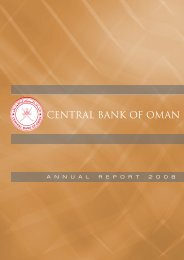
![KNOW YOUR NEW GIBRALTAR BANKNOTES - [Home] bThe/b](https://img.yumpu.com/50890985/1/184x260/know-your-new-gibraltar-banknotes-home-bthe-b.jpg?quality=85)
![PAPUA NEW GUINEA - [Home] - Polymer Bank Notes of the World](https://img.yumpu.com/49758743/1/190x143/papua-new-guinea-home-polymer-bank-notes-of-the-world.jpg?quality=85)

